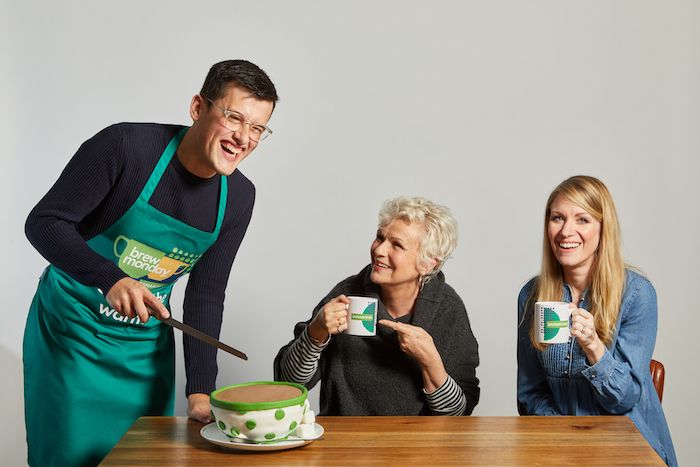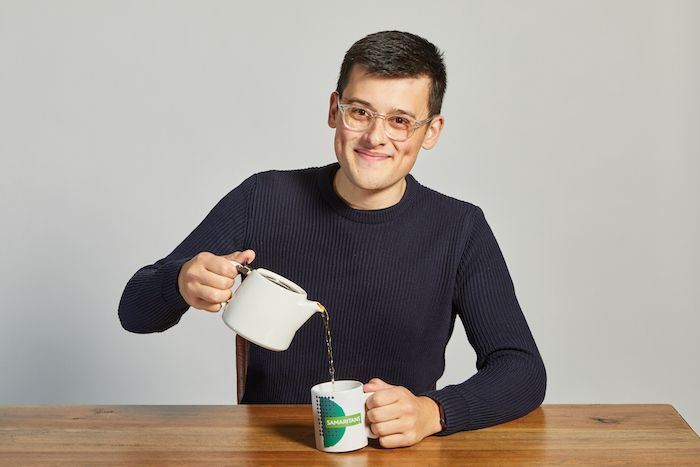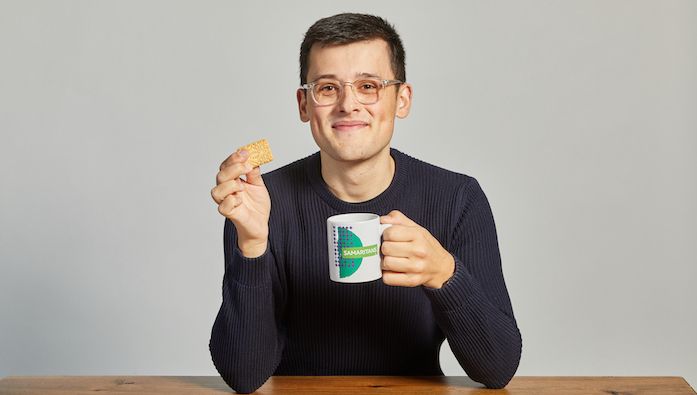Working with Samaritans to support their Brew Monday campaign, 2019 Bake Off contestant Michael Chakraverty puts the kettle on and settles in for a chat
Here at the Happiful office, we’re big fans of the Great British Bake Off. We’ve talked to previous contestants and are pleased to see how open many of them are about mental health – and during the latest series, we all fell a little bit in love with Michael Chakraverty.
The way he brought together elements from his Scottish and Indian heritage, his reaction when he got the coveted first ‘Paul Hollywood handshake’ of the season and the obvious bonds he made with fellow contestants all made us want to be part of his gang.
When he came up against week five’s technical challenge, Beignet Soufflés, the baker struggled. He’s since written about what really happened that week for inews.
“I am hunched over a deep fat fryer unable to move, becoming less and less aware of my surroundings and struggling to catch my breath. The tent darkens as my chest tightens and my fingers tingle.
“This was nothing to do with the scant instructions or my complete lack of knowledge of what a beignet soufflé was (there’s no Google in the tent – what’s a millennial to do?). What had happened?”
“I had let down my guard, told myself that I wasn’t good enough and believed it. I was in the throes of a panic attack.”
He’s also written about the incredible support he received, not only from his fellow contestants but the Bake Off production team. Now the excitement of Bake Off is over, Michael is keen to continue the conversation about mental health.
Throughout January and February Michael is working with Samaritans to spread the word of their Brew Monday campaign. A simple but effective campaign that encourages people to put the kettle on, check in with others and raise a little money for a charity that supports thousands of people in the UK at the same time.
Loneliness and isolation can have a huge effect on both mental and physical health and can be as harmful as smoking 15 cigarettes in a day. The research into mental health suggests that those who feel lonely are more prone to depression and loneliness in older age, increasing their chance of suicide.
Making an effort to connect with others may sound simple, but it could be life-saving. We chat to Michael about his experience of mental health, Bake Off and why he’s so passionate about this campaign.

You’ve written really eloquently about your experience of anxiety and panic attacks – could you tell us how the experience of Bake Off affected your mental health?
Part of the reason I chose to take part in The Great British Bake Off was to challenge myself. I have lived with anxiety and depression for a long time, and I’m used to telling myself that I’m not able to do things. Applying for the show was a big step in pushing myself to do something that made me uncomfortable – and a subsequent series of endless surprises landed me in the tent!
A big part of my experience in the Bake Off tent was managing my mental health. I was under an enormous amount of pressure (mostly from myself) to prove to myself time and time again that I could do more than I thought I could. And – for the most part – I did!
In week five, I experienced two panic attacks in quick succession. I’d somehow managed to mess up choux pastry (despite making it fairly regularly at home) and, just for a moment, I let down my guard. In that instant, the feelings of worthlessness flooded in, and I found them really hard to combat. I ended up in a spiral of negative thought, feeling overwhelmed and out of my depth. Panic attacks can be really scary, and the drop you feel immediately afterwards can be almost harder to deal with.
From somewhere, I found the strength to keep going. I had to prove to myself that I could do at least something – so I set out a new plan of action. I broke the remainder of the challenge into five-minute segments, telling myself that simply getting to the end would be a success in itself, and it was. I may have produced the worst beignet soufflés the world had ever seen (beaten only by David’s even sorrier attempts) but I left the tent feeling immensely proud that I’d achieved something bigger than baking.
How did the support of your fellow contestants and the Bake Off team help?
The Bake Off team were aware of the issues I’d experienced with my mental health and were incredibly supportive both in the tent and while practising at home – they were always on the end of the phone whenever I needed them. This support continued throughout the broadcast, too.
My fellow contestants were incredible in their kindness. They’d take time out of their own practice to listen to my concerns, and would go for long, calming walks in between challenges to create headspace. I know that a few of them found seeing my panic attacks quite upsetting and alarming – and it can be, for those who have never experienced one before – but their response was truly moving.
They voiced their concern by listening to me, giving me space and most importantly, trying to learn more and to understand. I know the friendships forged under such intense pressure will be friendships for life.

How do community and connection impact your life and mental health today?
Community and connection are vital for me, particularly when my anxiety or depression have flared up. My first response when I am feeling low is to lock myself away from anyone and everyone. While this can quieten some of my thoughts, it often can leave me at their mercy and my thought spirals can take control.
I am incredibly lucky to have some wonderful friends who can spot those warning signs and who’ll break through with a message, or a call, or even pop round to check-in. Having people who will listen and not jump to quick fixes is truly incredible. Sometimes they’ll sit in comfortable silence with me, just so I don’t feel alone. Loneliness compounds my mental health lows – so having a community of friends and family around me who’ll make sure I know they're there is vital.
Can you tell us more about Brew Monday and why you’re passionate about working with Samaritans?
Brew Monday is a really simple idea – just reaching out to one another and checking in. As I know from my own experiences, loneliness can creep in at any time, under any guise, and can make difficult days even harder. Knowing that someone is there to listen and to support you is crucial, and that’s what Brew Monday is all about. If we can each let at least one person know that we’re there for them as part of this campaign, I truly believe that we can open doors for people who didn’t know they were there.
I have had experience of using the Samaritans service myself when I felt truly alone and I know first-hand the effect that having someone on your side, who’ll listen without judgement, can have. Samaritans is run by incredible volunteers who change lives each and every day – and if we can do anything to help them help us, we must.
You can have your own Brew Monday any Monday in January and February, for more details and fundraising materials, visit Samaritans.
Find out more about loneliness, how it affects us and how counselling can help.


Comments